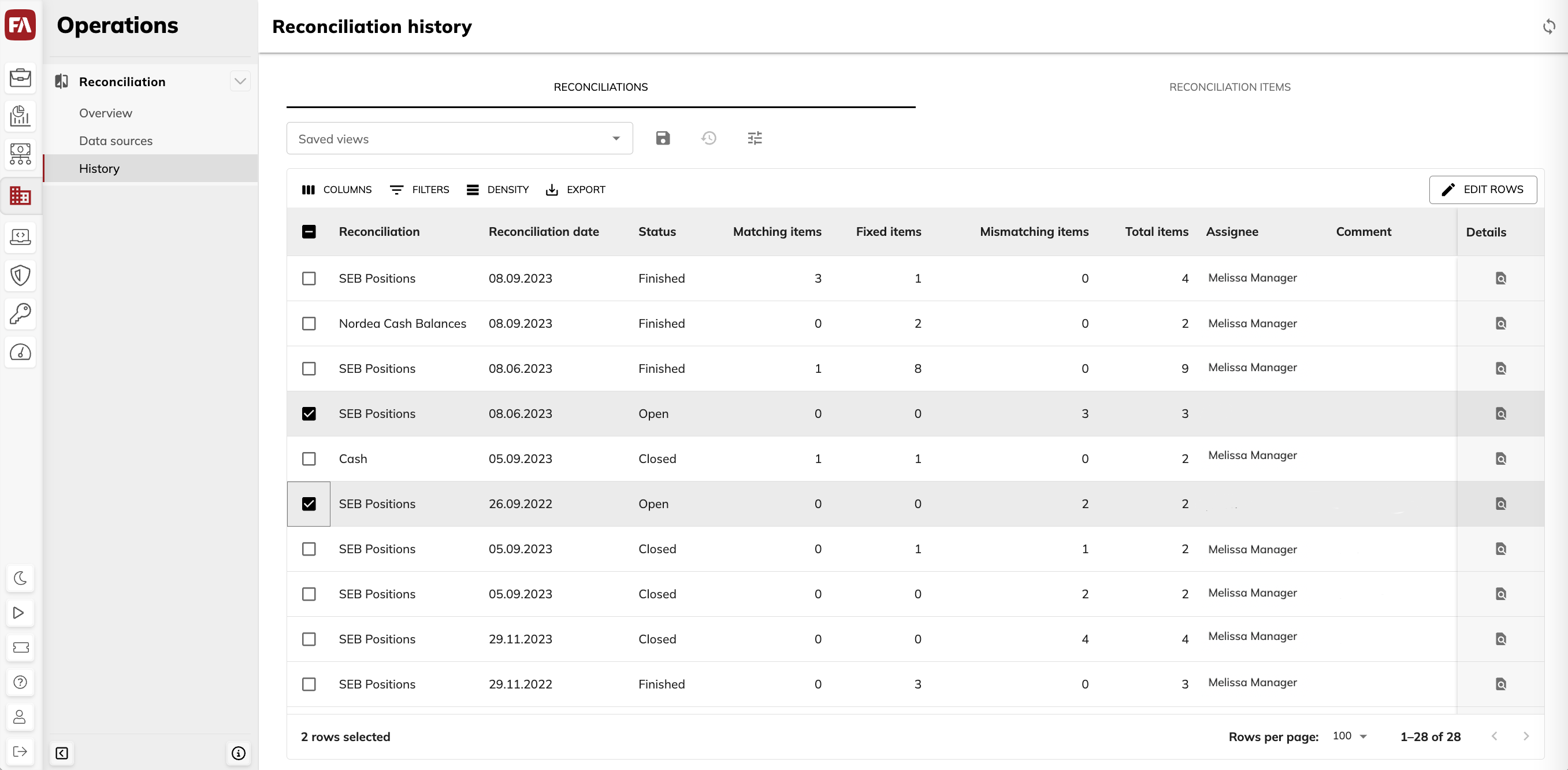Track changes and view history
FA Operations tracks the changes made by the users and stores the history of reconciliations and reconciliation items.
Audit logs show who and when made changes to a reconciliation or a reconciliation item. You can see the old and new value of the property that was changed.
Reconciliation history shows closed reconciliations and items.
Audit logs
To access audit logs for a reconciliation, open the reconciliation in the Reconciliation overview or History view and click Audit log at the upper right.
To access audit logs for a specific reconciliation item, open it in the Reconciliation overview or History view and go to the Audit log section.
Reconciliation history
To access all reconciliations that have been uploaded in FA Operations and view the reconciliation items, open the History view.
 |
View reconciliations
The Reconciliations tab of the History view shows the list of all reconciliations in the system. You can:
Download the reconciliations list in the CSV or XLSX format (click Export).
View reconciliation details and the list of reconciled items (click
 in the reconciliation row). To download the reconciliation report, then click Download report in the upper-right corner. If the reconciliation is open, you can make changes or rerun the reconciliation.
in the reconciliation row). To download the reconciliation report, then click Download report in the upper-right corner. If the reconciliation is open, you can make changes or rerun the reconciliation.View the details and the audit log of each reconciliation item (click
 in the item row). To download the reconciliation report, click the PDF icon
in the item row). To download the reconciliation report, click the PDF icon  . If the item is open, you can make changes or rerun the reconciliation for it.
. If the item is open, you can make changes or rerun the reconciliation for it.
View all reconciliation items
The Reconciliation items tab of the History view shows the list of all reconciliation items that have been uploaded in the system. You can:
Download the list of all items in the CSV or XLSX format (click Export).
View the details and the audit log of each reconciliation item (click
 in the item row). To download the reconciliation report, click the PDF icon
in the item row). To download the reconciliation report, click the PDF icon  . If the item is open, you can make changes or rerun the reconciliation for it.
. If the item is open, you can make changes or rerun the reconciliation for it.
Adjust the view
You can adjust the table layout and specify the search criteria, and then save these modifications for later:
Make your adjustments. You can:
Adjust columns.
Show or hide columns (
 ).
).Reorder by dragging and dropping.
Change the width by dragging the boundary.
Sort by clicking the column name.
Adjust table row density (
 ).
).Filter the table based on column content (
 ).
).Search the table with the search fields at the top of the view.
Click
 and enter a name for the view.
and enter a name for the view.Click Save.
The adjustments are saved as a view, including the search fields at the top. You can now:
Set a saved view as the default. The default view is applied after you reopen the app in a new browser tab. To do this, click the Saved views field or
 , and then click the star icon
, and then click the star icon  next to the saved view.
next to the saved view.Open a saved view, work with it and make changes to it, and then use
 to restore the view to its previously saved settings.
to restore the view to its previously saved settings.Clear the saved view and return to the initial system view (click
 in the Saved views field).
in the Saved views field).Rename or delete saved views (click
 to open the saved views sidepane).
to open the saved views sidepane).